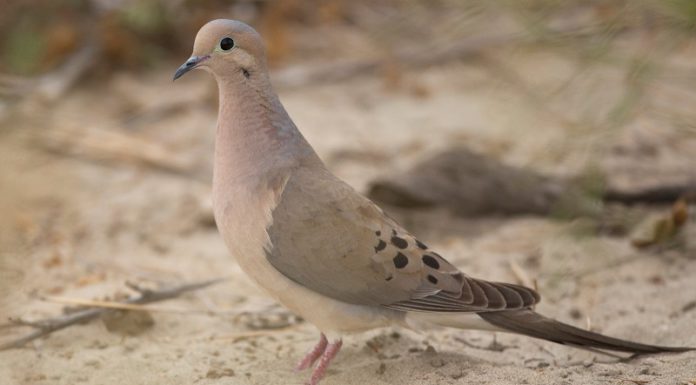California’s dove season opens Wednesday, Sept. 1, and the California Department of Fish and Wildlife (CDFW) has prepared crop fields at many of its most popular wildlife areas throughout the state to attract doves and provide productive dove hunting opportunities for the public.
“It looks like it’s going to be a good opener in the San Joaquin Valley,” said Ben Lewis, Upland Game Coordinator for CDFW’s Central Region, which includes the Los Banos Wildlife Area, the Mendota Wildlife Area, the North Grasslands Wildlife Area and other popular dove hunting hotspots. “We’ve seen really strong numbers from our dove banding efforts. The weather is holding right now. We haven’t had any cold snaps that would move the birds out. The birds that are here should stay here for the opener.”
All of CDFW’s most popular wildlife areas for dove hunting will be open to the public during the first half of the dove season, which extends from Sept. 1 through 15, 2021. The season will be closed from Sept. 16 through Nov. 12, and then open again from Nov. 13 through Dec. 27. Food plots planted for dove typically consist of wheat, safflower or sunflower. The food and habitat benefit a variety of different bird and wildlife species throughout the year beyond dove. Drought conditions may have impacted crop production in fields that weren’t irrigated. Preseason scouting is strongly encouraged where allowed.
CDFW areas planted with crops and open to public dove hunting Sept. 1 include Upper Butte Basin, Gray Lodge, Oroville, Yolo Bypass, Spenceville, North Grasslands, Mendota, Los Banos and Imperial Valley wildlife areas, and the Palo Verde Ecological Reserve. Several CDFW wildlife areas have dove hunting maps available at their individual web pages. Printed maps are available at some check station locations.
Entry procedures vary from area to area, so hunters are advised to call ahead in preparing for their hunt.
Portions of the Los Banos and North Grasslands wildlife areas in Merced County, including the Salt Slough and China Island units, are restricted to special permit holders until noon on Sept. 1, after which they open to public hunting the remainder of the first dove season.
Southern California’s Imperial Valley offers some of the best dove hunting found anywhere in the nation. Imperial County provides additional public hunting opportunities on various fields planted with agricultural crops to attract doves. A map of the Upland Game Fields of Imperial County (PDF) is available on CDFW’s website.
CDFW also offers a number of special dove hunts throughout the first and second dove seasons on public and private land through a lottery on its Online License Sales and Services website. Descriptions of these hunts are available at CDFW’s Upland Game Wild Bird Hunts and SHARE Program pages.
Due to safeguards and limitations necessitated by COVID-19, CDFW asks all hunters to please respect physical distancing from other hunters and adhere to all site-specific rules and regulations.
In ongoing monitoring efforts, preliminary results show a strong statewide dove banding effort in 2021. More than 2,500 doves have been banded compared to the 1,861 birds banded in 2020. Hunters who encounter a banded bird are asked to report it to the U.S. Geological Survey Bird Banding Lab (reportband.gov). Banded birds are part of important biological monitoring and reporting of bands completes the process. After reporting, hunters will receive a certificate of appreciation identifying the general capture location, estimated age of the bird and other information.
Mourning doves are among the most numerous of any upland game bird species. California hunters harvested almost 700,00 mourning doves during the 2020-21 hunting season. The U.S. Fish and Wildlife Service estimates the total mourning dove population among seven western states, including California, at more than 33 million birds.
The Sept. 1 dove opener marks the traditional start of California’s hunting season and typically brings together multiple generations of family and friends to participate in one of California’s most anticipated hunting seasons of the year.
The dove opener often is the first hunting season for new hunters who have recently completed Hunter Education. Doves concentrate in and around agricultural areas and can provide fast, challenging action. Minimal equipment is required beyond a valid California hunting license, an upland game bird validation (for hunters 18 and older), a shotgun of almost any gauge, nonlead ammunition, sun protection and plenty of water to stay hydrated in typically hot weather. Doves, delicious on the table, are many hunters’ favorite wild game species to eat.
California is home to several species of dove. Mourning dove and white-winged dove have a daily bag limit of 15, up to 10 of which may be white-winged dove. The possession limit is triple the daily bag limit. There are no limits on spotted dove and ringed turtle doves. Hunting for Eurasian collard-dove is legal year-round with no limit. A Dove Identification guide (PDF) is available at CDFW’s website.
Shooting hours for dove begin one-half hour before sunrise and end at sunset.
MORE WON DOVE HUNTING CONTENT:
Hunters can take a bow on the 15-bird limit on doves.




